List of rulers of Mecklenburg
This list of dukes and grand dukes of Mecklenburg dates from the origins of the German princely state of Mecklenburg's royal house in the High Middle Ages to the monarchy's abolition at the end of World War I. Strictly speaking, Mecklenburg's princely dynasty was descended linearly from the princes (or kings) of a Slavic tribe, the Obotrites, and had its original residence in a castle (Mecklenburg) in Dorf Mecklenburg (Mikelenburg) close to Wismar.[1] As part of a feudal union under German law from 1160—at first under the Saxons—Mecklenburg was granted imperial immediacy in 1348 and its princely rulers styled Dukes of Mecklenburg.[2] Despite several partitions, Mecklenburg remained an integral state until the end of the monarchy. The First Partition of Mecklenburg came in 1234, causing the principality to lose land. Thus arose the partial principalities (lordships) of Werle, Parchim-Richenberg, Rostock and Mecklenburg.[3] In modern times it was divided into the two (partial) duchies of Mecklenburg-Schwerin (I) and Mecklenburg-Stargard (1348–1471), Mecklenburg-Schwerin (II) and Mecklenburg-Güstrow (1555–1695), and with the Treaty of Hamburg (1701) into Mecklenburg-Schwerin (III) and Mecklenburg-Strelitz.[1][4] However, the dynasty always retained feudal rights to the entire fief and the rulers of both parts of the country always had identical titles,[4] which led to diplomatic confusion.
| Monarchy of Mecklenburg | |
|---|---|
State | |
 Grand ducal coat of arms of Mecklenburg-Schwerin | |
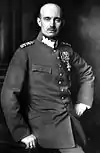 Frederick Francis IV of Mecklenburg-Schwerin | |
| Details | |
| Style | His Royal Highness |
| First monarch | Niklot |
| Last monarch | Frederick Francis IV, Grand Duke of Mecklenburg-Schwerin |
| Formation | 1130 |
| Abolition | 1918 |
| Appointer | Hereditary |
| Pretender(s) | Borwin, Duke of Mecklenburg |
The Congress of Vienna in 1815 granted the ruling dukes an adjustment in rank with the title Grand Duke of Mecklenburg and the personal style Royal Highness.[1] Both parts of the country were henceforth designated Grand Duchies. Besides both rulers, each heir to the throne, their respective wives and all other members of the princely family used the title of Duke (or Duchess) of Mecklenburg, notwithstanding the customary name of Princes and Princesses. The rulers of Mecklenburg were styled Duke of (from 1815 Grand Duke of) Mecklenburg, Prince of the Wends, Schwerin and Ratzeburg, and Count of Schwerin, Lord of the Lands of Rostock and Stargard (Herzog zu / Großherzog von Mecklenburg, Fürst zu Wenden, Schwerin und Ratzeburg, auch Graf zu Schwerin, der Lande Rostock und Stargard Herr).[5]
At the end of the monarchy in 1918, the House of Mecklenburg was the oldest ruling princely dynasty in Germany. During the Weimar Republic, the former princely title was turned into a commoner's surname, Herzog zu Mecklenburg ("Duke of Mecklenburg").[5]
The Land of the Obotrites
As allies of the Carolingian kings and the empire of their Ottonian successors, the Obotrites fought from 808 to 1200 against the kings of Denmark, who wished to rule the Baltic region independently of the empire. When opportunities arose, for instance upon the death of an emperor, they would seek to seize power; and in 983 Hamburg was destroyed by the Obotrites under their king, Mstivoj. At times they levied tribute from the Danes and Saxons. Under the leadership of Niklot, they resisted a Christian assault during the Wendish Crusade.

German missionaries such as Vicelinus converted the Obotrites to Christianity. In 1170 they acknowledged the suzerainty of the Holy Roman Empire, leading to Germanisation and assimilation over the following centuries. The ruling clan of the Obotrites kept its power throughout the Germanisation and ruled their country (except of a short interruption in Thirty Years' War) as House of Mecklenburg until the end of monarchies in Germany in November Revolution 1918.
List of Obotrite leaders

| Ruler | Reign | Notes |
|---|---|---|
| Witzlaus | ?–ca. 795 | |
| Thrasco | ?–ca. 795-810 | |
| Slavomir (de) | ?–810-819 | Ally of the Frankish Empire. In 816, he joined the rebellion of the Sorbs. Eventually captured and abandoned by his own people, being replaced by Ceadrag in 818. |
| Ceadrag (de) | 819 - after 826 | Ally of the Frankish Empire. He rebelled against the Franks with alliance with the Danes, but later was reconciled with Franks. |
| Selibur | ||
| Nako | 954-966 | Nako and his brother Stoigniew were defeated at the Raxa river (955) by Otto I, after which Stoigniew was beheaded and Nako accepted Christianity, resulting in thirty years of peace. |
| Mstivoj and Mstidrag | 966 - 995 | Sons of Nako. They abandoned Christianity and revolted against the Germans (Great Slav Rising). |
| Mieceslas III | 919 - 999 | in 995 defeated by Otto III, Holy Roman Emperor. |
| Mstislav | 996 - 1018 | |
| Udo or Przybigniew | 1018 - 1028 | |
| Ratibor | 1028 - 1043 | |
| Gottschalk | 1043 to 1066 | Founder of the Wendian State |
| Budivoj | 1066 and 1069 | |
| Kruto | 1066-1069 and 1069-1093 | |
| Henry | 1093 - 1127 | |
| Niklot | 1131–1160 | Born around 1090. Also ruled the subdued Polabian Slav tribes of Kessinians and Circipanians. |
| Pribislav | 1160–1167 | Last Obotrite prince. Accepted Saxon suzerainty in 1167. |
The rulers of Obotrite lands were later the Dukes and Grand Dukes of Mecklenburg.
The Saxon suzerainty and the land of Mecklenburg
From the 7th through the 12th centuries, the area of Mecklenburg was taken over by Western Slavic peoples, most notably the Obotrites and other tribes that Frankish sources referred to as "Wends". The 11th century founder of the Mecklenburgian dynasty of Dukes and later Grand Dukes, which lasted until 1918, was Nyklot of the Obotrites.
In the late 12th century, Henry the Lion, Duke of the Saxons, conquered the region, subjugated its local lords, and Christianized its people, in a precursor to the Northern Crusades. From 12th to 14th century, large numbers of Germans and Flemings settled the area (Ostsiedlung), importing German law and improved agricultural techniques. The Wends who survived all warfare and devastation of the centuries before, including invasions of and expeditions into Saxony, Denmark and Liutizic areas as well as internal conflicts, were assimilated in the centuries thereafter. However, elements of certain names and words used in Mecklenburg speak to the lingering Slavic influence. An example would be the city of Schwerin, which was originally called Zuarin in Slavic. Another example is the town of Bresegard, the 'gard' portion of the town name deriving from the Slavic word 'grad', meaning city or town.
Partitions of Mecklenburg
Like many German territories, Mecklenburg was sometimes partitioned and re-partitioned among different members of the ruling dynasty. The division started in 1227.
Partition of 1227
In 1227, Henry Borwin II divided his lands of Mecklenburg among his sons: John received the area called Mecklenburg; Nicholas received Werle; Henry Borwin III Rostock and Pribislaus Parchim-Rinchenberg. In 1256, the latter showed incapacity for government and his brothers deposed him, dividing his lands among themselves.
In 1314 the land of Nicholas the Child of Rostock died without heirs; his lands were annexed to Mecklenburg-Mecklenburg.
In 1348 Mecklenburg-Mecklenburg and its possessions were elevated as an unified duchy, with seat at Schwerin. The line of Mecklenburg-Mecklenburg then took the seat's name for their branch: from 1348, when elevated, the line of Mecklenburg-Mecklenburg changed to Mecklenburg-Schwerin.
In 1352 the duchy of Mecklenburg-Schwerin was again divided: from Schwerin grew a new line of dukes, called Mecklenburg-Stargard.
In 1436 the Werle line, and in 1471 the Stargard line were annexed to Mecklenburg-Schwerin, reuniting all the lands of Mecklenburg.
Partition of 1520
In 1520 the united Mecklenburg, bearing the name Mecklenburg-Schwerin, was redivided. The line of Mecklenburg-Güstrow splits off from the elder line of Mecklenburg-Schwerin. In 1695 Mecklenburg-Schwerin-Güstrow was reabsorbed in Mecklenburg, reuniting the duchy one more time.
Partition of 1701
In 1701 the united Mecklenburg, bearing the name Mecklenburg-Schwerin, was redivided. The line of Mecklenburg-Strelitz splits off from the elder line of Mecklenburg-Schwerin. In 1918, at the end of World War I, the monarchy was abolished, with the duchy still divided.
Partitions of Mecklenburg under Mecklenburg rule
| Lordship of Rostock (1227-1314) |
Lordship of Mecklenburg (1167-1347) |
Lordship of Werle (1227-) |
Lordship of Parchim (1227-1256) | |
| Lordship of Werle-Güstrow (1281-1291) |
Lordship of Werle-Parchim (1281-1291) | |||
| Lordship of Werle (Parchim line) (1291-1316) | ||||
| Lordship of Werle-Goldberg (1316-1374) | ||||
| Lordship of Werle-Waren (1337-1425) |
Lordship of Werle-Güstrow (1316-1425) | |||
| Duchy of Mecklenburg- Stargard (1352-1471) |
Raised to: Duchy of Mecklenburg (1347-1520) (in 1379-1423 divided in part 1, part 2 and part 3) | |||
| Lordship of Werle (Gustrow line) (1425-1436) | ||||
| Duchy of Mecklenburg-Schwerin (2nd creation) (1520-1695) |
Duchy of Mecklenburg-Güstrow (1520-1695) | |||
| Duchy of Mecklenburg (Schwerin line) (1695-1701) | ||||
| Duchy of Mecklenburg-Schwerin (3rd creation) (1701-1918) |
Duchy of Mecklenburg-Strelitz (1701-1918) | |||
Table of rulers
(Note: The current numbering system established for the rulers of Mecklenburg is based in the following: the Mecklenburgian group (Mecklenbugr, and then Schwerin, later Gustrow and Strelitz) form one group of a single numbering. The other parts of Mecklenburg (Parchim, Werle and divisions, Rostock and Stargard) have their own and independent numberings for their rulers.)
| Ruler | Born | Reign | Death | Ruling part | Consort | Notes | |
|---|---|---|---|---|---|---|---|
| Pribislaus I | 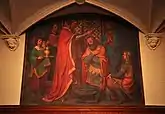 | ? | 1167-1178 | 30 December 1178 | Mecklenburg | Woizlava of Pomerania before 1178 at least one child | First lord of Mecklenburg. (Son of Niklot), Prince of the Obotrites, Lord of Mecklenburg |
| Henry Borwin I | 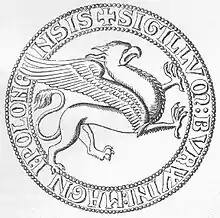 | ? | 1178-1219 | 28 January 1227 | Mecklenburg | Matilda of Saxony c.1170 two children Adelaide before 1227 one child |
Henry Borwin ruled jointly with his cousin Nicholas I (son of Warcislaus of Rostock). Abdicated in 1219. |
| Nicholas I | 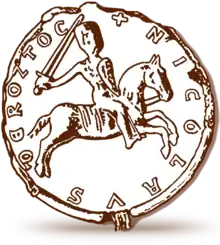 | 1164 | 1178-1200 | 25 May 1200 | Mecklenburg | Unmarried | |
| Henry Borwin II | .jpg.webp) | 1170 | 1219-1226 | 5 June 1226 | Mecklenburg | Christina of Sweden c.1200 six children |
Sons of Henry Borwin I, ruled jointly. |
| Nicholas II | 1180 | 1219-1225 | 28 September 1225 | Mecklenburg | Unmarried | ||
| John I the Theologian | c.1211 | 1227-1264 | 1 August 1264 | Mecklenburg | Luitgard of Henneberg c.1230 seven children | Son of Henry Borwin II. Received the land of Mecklenburg. | |
| Nicholas I | c. 1210 | 1227-1277 | 14 May 1277 | Werle | Judith of Anhalt 1231 seven children | Son of Henry Borwin II. Received the land of Werle. | |
| Henry Borwin III | c. 1220 | 1227-1278 | 1 August 1278 | Rostock | Sophia of Sweden 1237 four children | Son of Henry Borwin II. Received the land of Rostock. | |
| Pribislaus I | 1224 | 1227-1256 | after 12 February 1275 | Parchim-Richenberg | Unmarried | Son of Henry Borwin II. Received the land of Parchim-Richenberg, but he hadn't the capacity for rule, and was deposed by his brothers, who divided his land between them. | |
| Henry I the Pilgrim | c.1230 | 1264-1271 (1299-1302 probably only titular) | 2 January 1302 | Mecklenburg | Anastasia of Pomerania c.1259 three children |
In 1271, he made a pilgrimage to the Holy Land. Along the way, he was taken prisoner and deported to Cairo, where he was held in captivity by the Arabs for 27 years. During his absence, Mecklenburg was ruled by his brothers John II and Nicholas III, after a fight between his brothers and cousins about the regency and the guardianship of his children. After John II died in 1283, Nicholas III ruled with his nephew John III until the latter's death in 1289. Nicholas died that year. Henry I returned to Mecklenburg via Morea and Rome in 1298. In 1299, he formally resumed his reign, although he probably left the business of government mostly to his son Henry II. | |
| Albert I | c.1230 | 1264-1265 | 15 May or 17 May 1265 | Mecklenburg | Unknown | ||
| Nicholas III | c.1230 | 1264-1289 | 8 June 1289 or 1290 | Mecklenburg | Unknown | ||
| John II | c.1250 | 1264-1299 | 12 October 1299 | Mecklenburg | Unknown | ||
| John III | c.1250 | 1287-1289 | 27 May 1289 | Mecklenburg | Helena of Rügen 3 November 1288 one child | ||
| Henry I | c. 1245 | 1277-1291 | 8 October 1291 | Werle-Güstrow | Richeza of Sweden 1262 three children Matilda of Brunswick-Lüneburg I 1291 no children |
Children of Nicholas I, ruled jointly until 1281, when they divided their patrimony. Henry kept Güstrow, John inherited Parchim and Bernard ruled at Prisannewitz. Bernard left no descendants, and his lands were divided between Parchim and Güstrow. | |
| John I | c. 1245 | 1277-1283 | 15 October 1283 | Werle-Parchim | Sophia of Lindow-Ruppin before 1275 six children | ||
| Bernard I | c. 1245 | 1277-1286 | c.1286 | Werle (at Prisannewitz) | Unmarried | ||
| Valdemar | before 1241 | 1278-1282 | 9 November 1282 | Rostock | Agnes of Holstein-Kiel before 1262 three children | ||
| Regency of Agnes of Holstein-Kiel (1282-1284) | Died without male heirs. His inheritance went to Henry II of Mecklenburg. | ||||||
| Nicholas I the Child | before 1262 | 1282-1314 | 25 November 1314 | Rostock | Margaret of Pomerania-Wolgast 1299 one child | ||
| Rostock was definitely annexed to Mecklenburg | |||||||
| Henry II | before 1283 | 1291-1294 | 1307 | Werle-Güstrow | Beatrice of Pomerania before 1290 two children | After his death with no descendants, Güstrow was annexed to Parchim. | |
| Werle-Güstrow was definitely annexed to Werle-Parchim, which became Werle (1294-1316) | |||||||
| Nicholas II | before 1283 | 1291-1294 | 18 February 1316 | Werle-Parchim | Richeza of Denmark 1292 two children Matilda of Brunswick-Lüneburg II after 1308 no children |
Co-ruled with his uncles Henry I and Bernard I since 1283. In 1294 reunited Werle. | |
| 1294-1316 | Werle | ||||||
| Henry II the Lion | after 14 April 1266 | 1290-1329 (with his father as titular duke 1299-1302) | 21 January 1329 | Mecklenburg | Beatrix of Brandenburg c.1290 one child Anna of Saxe-Wittenberg after 6 July 1315 seven children Agnes of Lindow-Ruppin After 1324 no children | Son of Henry I, ruled from 1287 under regency of his uncles Nicholas III and John II, as his father Henry I was taken prisoner in the Holy Land. In 1298, he returned and Henry IV became co-ruler. Ruled alone from 1302. | |
| John II the Bald | after 1250 | 1316-1337 | 27 August 1337 | Werle-Güstrow | Matilda of Brunswick-Grubenhagen 1311 four children |
Brother and son of Nicholas II, respectively. In 1316 there was a new subdivision of Werle in Goldberg and Güstrow, this last subdivided again in -Gustrow and -Waren in 1337. | |
| John III Ruoden | before 1300 | 1316-1350 | 1352 | Werle-Goldberg | Matilda of Pomerania 1317 three children Richardis before 1350 two children | ||
| Council of Regency (1329-1336) | Children of Henry II, ruled jointly. When Albert was raised to duke in 1348, John split off Stargard to rule independently. | ||||||
| Albert II the Great | 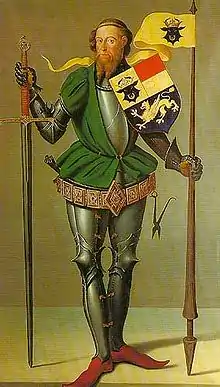 | c.1318 | 1329-1379 | 18 February 1379 | Lordship of Mecklenburg (1329–47) Duchy of Mecklenburg (1347–79) | Euphemia of Sweden 10 April 1336 five children Adelheid of Hohenstein after 1370 no children | |
| John I | c.1326 | 1329-1348 | 9 August 1392/9 February 1393 | Lordship of Mecklenburg | Rixa no children Anna of Holstein-Pinneberg before 1358 one child Agnes of Lindow-Ruppin 1358 five children | ||
| 1348-1392/93 | Mecklenburg-Stargard | ||||||
| Nicholas III Staveleke | after 1311 | 1337-1360 | 1360/1361 | Werle-Güstrow | Agnes of Mecklenburg 6 January 1338 two children Matilda of Holstein-Plön after 1341 one child |
Children of John II, divided the land. | |
| Bernard II | c.1320 | 1337-1382 | between 16 January and 13 April 1382 | Werle-Waren | Elisabeth of Holstein-Plön 1341 three children | ||
| Nicholas IV the Pig-Eyed | after 1311 | 1350-1354 | 1360/1361 | Werle-Goldberg | Agnes of Lindow-Ruppin before 1350 three children | ||
| Regency of Albert II, Duke of Mecklenburg and Nicholas III, Lord of Werle-Gustrow (1354-1360) | His part of Goldberg went to Werle-Gustrow after his death. | ||||||
| John IV | before 1350 | 1354-1374 | 1374 | Werle-Goldberg | Unmarried | ||
| Werle-Goldberg was definitely annexed to Werle-Güstrow | |||||||
| Lorenz | between 1338 and 1340 | 1360-1393/94 | between 24 February 1393 and 6 May 1394 | Werle-Güstrow | Matilda of Werle-Goldberg c.1375 three children |
Children of Nicholas III, ruled jointly. | |
| John V | between 1338 and 1340 | 1360-1378 | before 9 September 1378 | Werle-Güstrow | Euphemia of Mecklenburg-Schwerin before 1378 no children | ||
| Henry III the Hanger | 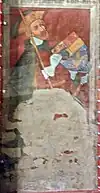 | c.1337 | 1379-1383 | 24 April 1383 | Mecklenburg (part 1) | Ingeborg of Denmark 1362 four children Matilda of Werle 26 February 1377 no children |
Children of Albert II, co-ruled jointly, but possibly in different parts of Mecklenburg. Albert III associated his eldest son Eric to his own part of Mecklenburg. Albert III's swedish ascendance allowed him to succeed as King of Sweden between 1364 and 1389. |
| Albert III | 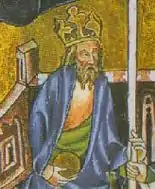 | c.1338 | 1379-1412 | March 1412 | Mecklenburg (part 2) | Richardis of Schwerin 1365 two children Agnes of Brunswick-Lüneburg 12/13 February 1396 Schwerin one child | |
| Eric I | after 1359 | 1396-1397 | 16 July 1397 | Mecklenburg (part 2) | Sophie of Pomerania-Wolgast 12/13 February 1396 Schwerin no children | ||
| Magnus I | 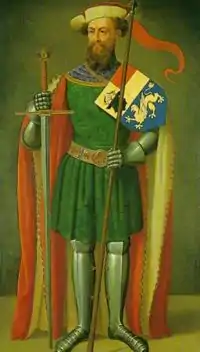 | c.1345 | 1379-1384 | 1 September 1384 | Mecklenburg (part 3) | Elizabeth of Pomerania-Wolgast after 1362 two children | |
| John VI | c.1320 | 1382-1395 | c. 1395 | Werle-Waren | Agnes of Mecklenburg-Werle-Goldberg before 1395 four children | ||
| Albert IV | 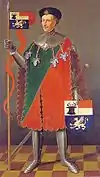 | before 1363 | 1383-1388 | between 24 and 31 December 1388 | Mecklenburg (part 1) | Elisabeth of Holstein-Rendsburg before 1388 no children | Left no children. His part of the co-rulership was probably divided between the other two. |
| Regencies of John I, Duke of Mecklenburg-Stargard (1384-1393) and John II, Duke of Mecklenburg-Stargard (1393-1395) | |||||||
| John IV | 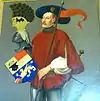 | before 1370 | 1384-1422 | 16 October 1422 | Mecklenburg (part 3) | Jutta von Hoya before 1415 no children Catherine of Saxe-Lauenburg 1416 two children | |
| John II | before 1370 | 1393-1416 | 6 July/9 October 1416 | Mecklenburg-Stargard | Wilheida-Catherine of Lithuania 1388 three children |
Sons of John I, ruled jointly. | |
| Ulrich I | before 1382 | 1393-1417 | 8 April 1417 | Mecklenburg-Stargard | Margaret of Pomerania-Stettin before 1400 three children | ||
| Albert I | before 1377 | 1393-1397 | between 11 February and 15 July 1397 | Mecklenburg-Stargard | Unmarried | ||
| Nicholas V | between 1341 and 1385 | 1395-1408 | after 21 January 1408 | Werle-Waren | Sophie of Pomerania-Wolgast after 1397 no children |
Sons of John VI, ruled jointly. After Christopher's death, Waren went to Gustrow. | |
| Christopher | before 1385 | 1385 1395-1425 | 25 August 1425 | Werle-Waren | Unmarried | ||
| Waren was definitely annexed to Güstrow | |||||||
| Balthasar | c.1375 | 1393/4-1421 | 5 April 1421 | Werle-Güstrow | Euphemia of Mecklenburg-Schwerin 18 October 1397 no children Helvig of Holstein-Rendsburg 18 April 1417 no children |
Children of Lorenz, ruled jointly. William reunited Werle, but left no descendants. Werle went to Mecklenburg. | |
| John VII | ca. 1375 | 1393/4-1414 | between 14 August and 17 December 1414 | Werle-Güstrow | Catherine of Saxe-Lauenburg before 1414 no children | ||
| William | c.1375 | 1393/4-1425 | 8 September 1436 | Werle-Güstrow | Anna of Anhalt 1422 no children Sophia of Pomerania after 1426 one child | ||
| 1425-1436 | Werle | ||||||
| Werle was definitely annexed to Mecklenburg | |||||||
| Regency of Agnes of Brunswick-Lüneburg (1412-1415) | |||||||
| Albert V | 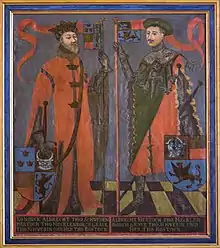 | 1397 | 1412-1423 | between 1 June and 6 December 1423 | Mecklenburg (part 2) | Margaret of Brandenburg 1423 no children | |
| John III | 1389 | 1417-1438 | after 11 November 1438 | Mecklenburg-Stargard | Luttrud of Anhalt-Köthen before 1438 no children |
Children of Ulrich (Albert and Henry) and John II (John III), ruled jointly. | |
| Albert II | before 1400 | 1417-1421/23 | between 11 February 1421 and 4 October 1423 | Mecklenburg-Stargard | Unmarried | ||
| Henry I Gaunt | before 1412 | 1417-1466 | between 26 May and 20 August 1466 | Mecklenburg-Stargard | Judith of Mecklenburg-Werle-Gustrow-Waren before 1427 no children Ingeborg of Pomerania-Stolp after 1427 two children Margaret of Brunswick-Lüneburg 1452 two children | ||
| Regency of Albert V, Duke of Mecklenburg (1422-1423) and Catherine of Saxe-Lauenburg (1422-1436) | Sons of John IV, reunited the parts held by the coregency period (1379-1423). Henry IV associated his eldest son John VI to the co-rulership, but he didn't survive him. | ||||||
| John V | 1418 | 1422-1442/43 | 1 November 1442/13 January 1443 | Mecklenburg (part 3 until 1423; all 3 parts since 1423) | Anna of Pomerania-Stettin 17 September 1436 no children | ||
| Henry IV the Fat | 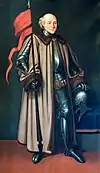 |
before 1417 | 1422-1477 | 9 March 1477 | Dorothea of Brandenburg May 1432 seven children | ||
| John VI | 1439 | 1451-1472 | 1472 | Unmarried | |||
| Ulrich II | before 1428 | 1466-1471 | 13 July 1471 | Mecklenburg-Stargard | Catherine of Mecklenburg-Werle-Gustrow between 24 February and 15 September 1454 no children | Son of Henry I. After his death Stargard was reunited to Mecklenburg. | |
| Stargard was definitely annexed to Mecklenburg | |||||||
| Magnus II | 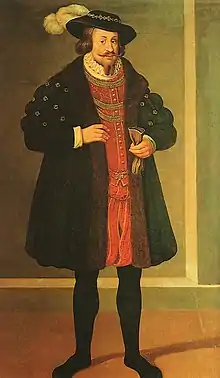 | before 1417 | 1477-1503 | 20 November 1503 | Mecklenburg | Sophia of Pomerania-Stettin 29 May 1478 seven children |
Children of Henry IV, ruled jointly. |
| Albert VI | 1438 | 1477-1483 | before 27 April 1483 | Mecklenburg | Catherine of Lindow-Ruppin 1466 or 1468 no children | ||
| Balthasar | 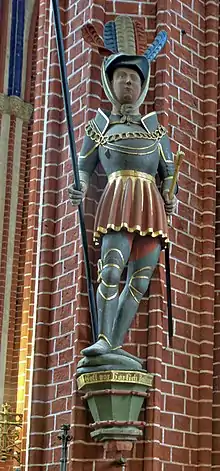 | 1451 | 1477-1507 | 16 March 1507 | Mecklenburg | Unmarried | |
| Henry V the Peaceful | .jpg.webp) | 3 May 1479 | 1503-1552 | 6 February 1552 | Mecklenburg-Schwerin | Sophia of Pomerania-Stettin 29 May 1478 seven children |
Children of Magnus II, ruled jointly until 1520, when a new division was made: Henry kept Schwerin and Albert Güstrow. |
| Albert VII the Handsome | 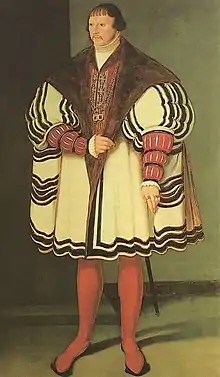 | 25 July 1486 | 1503-1547 | 7 January 1547 | Mecklenburg-Güstrow | Anna of Brandenburg 17 January 1524 Berlin ten children | |
| Eric II | 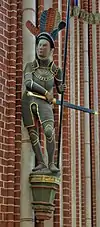 | 3 September 1483 | 1503-1508 | 22 December 1508 | Mecklenburg | Unmarried | |
| John Albert I | 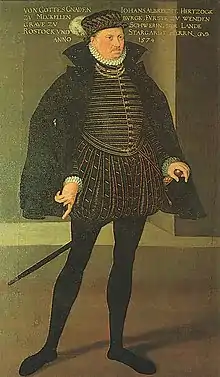 |
23 December 1525 | 1547-1552 | 12 February 1576 | Mecklenburg-Güstrow | Anna Sophia of Prussia 24 February 1555 Wismar three children |
Son of Albert VII, John Albert left Güstrow to his brother Ulrich, to rule in Schwerin with his cousin Philip, who was mentally disabled. His son inherited Schwerin, as Philip died with no heirs. |
| 1552-1576 | Mecklenburg-Schwerin | ||||||
| Philip | _-_Nationalmuseum_-_15253.tif.jpg.webp) | 12 September 1514 | 1552-1557 | 4 January 1557 | Mecklenburg-Schwerin | Unmarried | |
| Ulrich I | 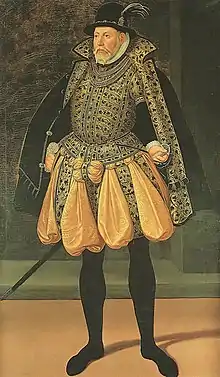 | 5 March 1527 | 1552-1603 | 14 March 1603 | Mecklenburg-Güstrow | Elizabeth of Denmark 14 February 1556 one child Anna of Pomerania-Wolgast 9 December 1588 no children | |
| John VII | 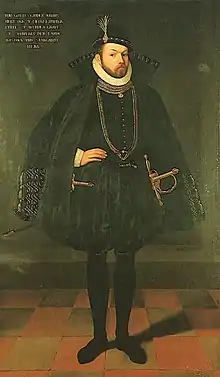 | 7 March 1558 | 1576-1592 | 22 March 1592 | Mecklenburg-Schwerin | 17 February 1588 three children | |
| Sophia of Holstein-Gottorp | 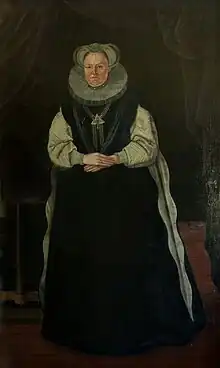 | 1 June 1569 | 1592-1634 | 14 November 1634 | Mecklenburg-Schwerin (at Lübz, Rehna and Wittenburg) | Received a widow seat, and in 1603, held regency for her sons. After her death the seats returned to the main duchy. | |
| Regencies of Ulrich, Duke of Mecklenburg (1592-1603) and Sophia of Holstein-Gottorp (1603-1608) | In 1628, the Emperor Ferdinand II deposed him and took his fiefs from him, but he was reinstated in 1631. In the period 1628-1631 the duchy was ruled by Albrecht von Wallenstein. | ||||||
| Adolf Frederick I | 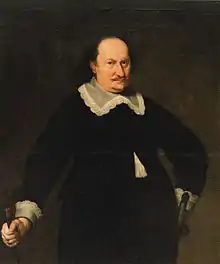 | 15 December 1588 | 1592-1658 | 27 February 1658 | Mecklenburg-Schwerin | Anna Maria of East Frisia 4 September 1622 eight children Maria Katharine of Brunswick-Dannenberg 1635 eleven children | |
| Charles I | 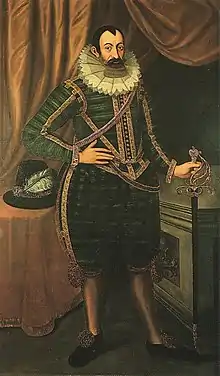 | 28 December 1540 | 1603-1610 | 22 July 1610 | Mecklenburg-Güstrow | Unmarried | Brother of Ulrich and John Albert I. |
| John Albert II | 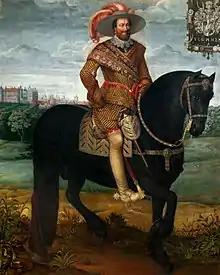 | 5 May 1590 | 1610-1636 | 23 April 1636 | Mecklenburg-Güstrow | Margaret Elizabeth of Mecklenburg-Güstrow 9 October 1608 four children Elizabeth of Hesse Kassel 25 March 1618 Kassel no children Eleonore Marie of Anhalt-Bernburg 7 May 1626 Güstrow five children | In 1628, the Emperor Ferdinand II deposed him and took his fiefs from him, but he was reinstated in 1631. In the period 1628-1631 the duchy was ruled by Albrecht von Wallenstein. |
| Regency of Adolph Frederick I, Duke of Mecklenburg-Schwerin (1636-1654) | His male heirs predeceased him, and his lands rejoined Mecklenburg, with the sole exception of the capital, inherited by the deceased's widow. | ||||||
| Gustav Adolph I | 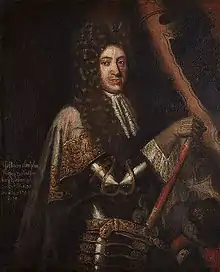 | 26 February 1633 | 1636-1695 | 6 October 1695 | Mecklenburg-Güstrow | Magdalena Sibylla of Holstein-Gottorp 28 December 1654 eleven children | |
| Christian Louis I | _von_Mecklenburg.jpg.webp) | 1 December 1623 | 1658-1692 | 21 June 1692 | Mecklenburg-Schwerin | Christine Margaret of Mecklenburg-Güstrow 21 February 1640 no children Elisabeth Angelique de Montmorency 3 March 1664 no children |
Children of Adolf Frederick I, divided the land. AS Christian left no descendants, he was succeeded by his brother Frederick's son. |
| Frederick I | 13 February 1638 | 1658-1688 | 28 April 1688 | Mecklenburg-Schwerin (at Grabow) | Christine Wilhelmine of Hesse-Homburg 28 May 1671 four children | ||
| Frederick William I | 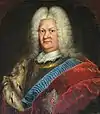 |
28 March 1675 | 1692-1695 1701-1713 |
31 July 1713 | Mecklenburg-Schwerin | Sophie Charlotte of Hesse-Kassel 2 January 1704 Kassel no children |
Son of Frederick, brother of Christian Louis I. Founded the 3rd line of Mecklenburg-Schwerin. In 1695, with the end of the Gustrow line, Mecklenburg was reunited again. However, in 1701 was again divided between Frederick William and his uncle, Adolf Frederick, son of Adolf Frederick I. |
| 1695-1701 | Mecklenburg | ||||||
| Magdalena Sibylla of Holstein-Gottorp | _-_Nationalmuseum_-_15955.tif.jpg.webp) | 14 November 1631 | 1695-1719 | 22 September 1719 | Mecklenburg-Güstrow (at Güstrow only) | Gustav Adolph I 28 December 1654 eleven children | Kept a widow's seat at Güstrow, which joined the rest of her late husband's patrimony after her death. |
| Adolf Frederick II | 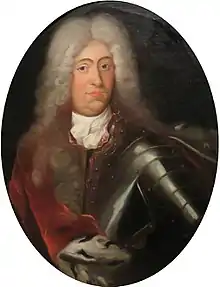 | 19 October 1658 | 1701-1708 | 12 May 1708 | Mecklenburg-Strelitz | Maria of Mecklenburg-Güstrow 1684 five children Joanna of Saxe.Gotha-Altenburg 20 June 1702 no children Christiane Emilie of Schwarzburg-Sondershausen 10 June 1705 Neustrelitz two children | Son of Adolf Frederick I. First of the line of Mecklenburg-Strelitz. |
| Adolf Frederick III | 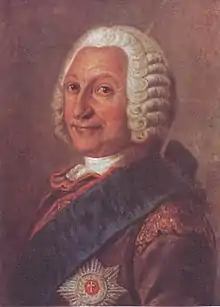 | 7 June 1686 | 1708-1752 | 11 December 1752 | Mecklenburg-Strelitz | Dorothea of Schleswig-Holstein-Sonderburg-Plön 16 April 1709 Reinfeld two children | Left no male heirs. |
| Charles Leopold I | 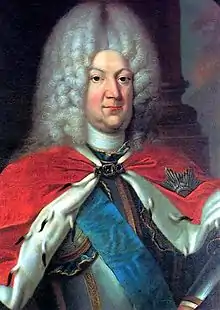 | 26 November 1678 | 1713-1728 | 28 November 1747 | Mecklenburg-Schwerin | Sophia Hedwig of Nassau-Dietz 27 May 1709 Leeuwarden no children Christine von Lepel 7 June 1710 Doberau (annulled 2 October 1711) no children Catherine Ivanovna of Russia 19 April 1716 Danzig one child | Brother of Frederick William I, was deposed in 1728 by the Aulic Council in Vienna in favour of his brother Christian Louis II. |
| Christian Louis II | 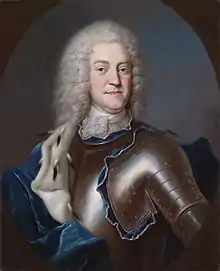 | 15 November 1683 | 1728-1756 | 30 May 1756 | Mecklenburg-Schwerin | Gustave Caroline of Mecklenburg-Strelitz 13 November 1714 five children | |
| Regency of Elisabeth Albertine of Saxe-Hildburghausen (1752-1753) | Son of Charles Frederick, son of Adolf Frederick II. Left no heirs. | ||||||
| Adolf Frederick IV | 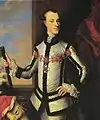 | 5 May 1738 | 1752-1794 | 2 June 1794 | Mecklenburg-Strelitz | Unmarried | |
| Frederick II the Pious | 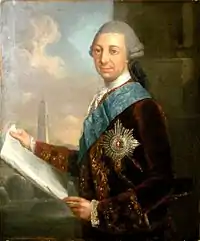 | 9 November 1717 | 1756-1785 | 24 April 1785 | Mecklenburg-Schwerin | Louise Frederica of Württemberg 2 March 1746 Schwedt four children | His heirs died in infancy and was succeeded by his nephew. |
| Frederick Francis I |  | 10 December 1756 | 1785-1837 | 1 February 1837 | Mecklenburg-Schwerin | Louise of Saxe-Gotha-Altenburg 1 June 1775 Gotha six children | Son of Louis, brother of Frederick I. In 1815 was raised to Grand Duke. |
| Charles II | %252C_Duke_of_Mecklenburg-Strelitz%252C_later_Carl_II%252C_Grand_Duke_of_Mecklenburg-Strelitz.jpg.webp) | 10 October 1741 | 1794-1816 | 6 November 1816 | Mecklenburg-Strelitz | Friederike of Hesse-Darmstadt 18 September 1768 Darmstadt ten children Charlotte of Hesse-Darmstadt 28 September 1784 Darmstadt one child | Brother of Adolf Frederick IV. |
| George I | .jpg.webp) | 12 August 1779 | 1816-1860 | 6 September 1860 | Mecklenburg-Strelitz | Marie of Hesse-Kassel 12 August 1817 Kassel four children | |
| Paul Frederick | 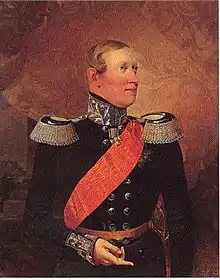 | 15 September 1800 | 1837-1842 | 7 March 1842 | Mecklenburg-Schwerin | Alexandrine of Prussia 25 May 1822 Berlin no children | Grandson of Frederick Francis I. |
| Frederick Francis II | 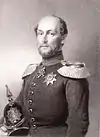 | 28 February 1823 | 1842-1883 | 15 April 1883 | Mecklenburg-Schwerin | Augusta Reuss of Köstritz 3 November 1849 Ludwigslust six children Anne of Hesse and by Rhine 4 July 1864 Darmstadt one child Marie of Schwarzburg-Rudolstadt 4 July 1868 Rudolstadt four children | |
| Frederick William II |  | 17 October 1819 | 1860-1904 | 30 May 1904 | Mecklenburg-Strelitz | Augusta of the United Kingdom 28 June 1843 London two children | |
| Frederick Francis III | 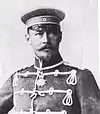 | 19 March 1851 | 1883-1897 | 10 April 1897 | Mecklenburg-Schwerin | Anastasia Mikhailovna of Russia 24 January 1879 Saint Petersburg three children | |
| Regency of John Albert of Mecklenburg (1897-1901) | Forced to abdicate in 1918, after the end of World War I | ||||||
| Frederick Francis IV |  | 9 April 1882 | 1897-1918 | 17 November 1945 | Mecklenburg-Schwerin | Alexandra of Hanover and Cumberland 7 June 1904 Gmunden five children | |
| Adolf Frederick V | .jpg.webp) | 22 July 1848 | 1904-1914 | 11 June 1914 | Mecklenburg-Strelitz | Elisabeth of Anhalt 17 April 1877 Dessau four children | |
| Adolf Frederick VI | 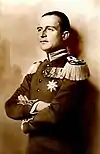 | 17 June 1882 | 1914-1918 | 23 February 1918 | Mecklenburg-Strelitz | Unmarried | Committed suicide in 1918, before the end of World War I. |
Notes
- "Fürsten und Gutsherren..."
- Wigger, p. 121
- (in German) Die Ortsgeschichte von Dobbertin
- "Von der Reformation..."
- House Laws of Mecklenburg
Bibliography
- Friedrich Wigger: Stammtafeln des Großherzoglichen Hauses von Meklenburg. In: Jahrbücher des Vereins für Mecklenburgische Geschichte und Altertumskunde 50 (1885), p. 111ff. (Digitalised)
External links
- Literature about List of rulers of Mecklenburg in the State bibliography of Mecklenburg-Vorpommern
- (in German) Fürsten und Gutsherren sorgten für Park- und Schlösserfluten, Mecklenburg-Pomerania Tourism Agency
- (in German) "Von der Reformation bis heute" ("From the Reformation until Today"), Evangelical Lutheran Church of Mecklenburg-Pomerania